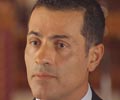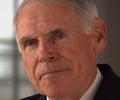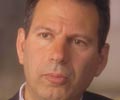The Taliban's resurgence in Afghanistan has been fueled by growing dissatisfaction with President Hamid Karzai's government, which is considered weak, corrupt and ineffective. Since 2001, it has received $15 billion in foreign aid.
- People
- Steve Coll
- Robert D. Kaplan
- Vali Nasr
- Adm. William Fallon (Ret.)
- Related Links
- Hamid Karzai
A roundup of articles and resources from The New York Times. - Reports Link Karzai's Brother to Afghanistan Heroin Trade
"Assertions [that Karzai's brother is a drug dealer] … have deeply worried top American officials in Kabul and in Washington. The United States officials fear that perceptions that the Afghan president might be protecting his brother are damaging his credibility and undermining efforts by the United States." (The New York Times, Oct. 4, 2008) - U.S. Study Is Said to Warn of Crisis in Afghanistan
"A draft report by American intelligence agencies concludes that Afghanistan is in a 'downward spiral' and casts serious doubt on the ability of the Afghan government to stem the rise in the Taliban's influence there." (The New York Times, Oct. 8, 2008) - Thwarting Afghanistan's Insurgency: A Pragmatic Approach toward Peace and Reconciliation
This report by Mohammad Masoom Stanekzai, adviser to Afghan President Hamid Karzai, lays out barriers to, and possible routes for, reconciliation in Afghanistan. Included are graphics detailing trends in violence, economics and opium cultivation. (United States Institute of Peace, September 2008)
Steve Coll The New Yorker; author, Ghost Wars
What power does Karzai have?
[President Karzai] runs a national government that receives a great deal of international support. …
But as the head of the Afghan state, his power is waning. The territory that he effectively controls as a president has been shrinking over the last few years. And his ability to govern, in a meaningful way, from Kabul, seems also to be waning, partly as a result of his own ineffectiveness and partly as a result of the Taliban's increasing ability to control territory as insurgents.
President Karzai is not the popular figure who has galvanized Afghans' national hopes for revival and for reconstruction, as he was when he was first elected president. However, he is still regarded as a credible national leader, albeit a weak one. …
One of the problems that the United States will confront in Afghanistan as it attempts to change the narrative of this war is a national election, scheduled for late 2009, that is going to be challenging on a number of counts: first, just the security problem of pulling it off and preventing voters from being killed on their way to the polls; and secondly, the question of what kind of Afghanistan is going to emerge from this election, what kind of leadership is going to emerge.
Is President Karzai going to be re-elected? If so, how is he going to improve on the performance that has been so heavily criticized in the last couple of years? And if there is new leadership, as is sometimes discussed, will it have the national reach that Karzai's presidency, at its best, has enjoyed?
What do you make of the allegations that he and his family are corrupt?
There are credible allegations from the United States government, including from the recently resigned head of counternarcotics at the State Department, who has said publicly that the evidence of corruption reaches into the Afghanistan government at the highest levels.
There's a perception that President Karzai is afraid to act against those, particularly in the poppy-growing areas of the south and the east, who are raking off profits from the drug economy, because his re-election is perceived to be at stake. These are the people who control the provinces where President Karzai has historically been strongest politically. And so the perception is that he is, at a minimum, passively tolerating this corruption, because those carrying it out seem to be crucial to his re-election. At worst, he or his closest allies are engaged in this for entirely selfish reasons.
Robert D. Kaplan The Atlantic; author, Soldiers of God
Over the last year or so, the security situation in Afghanistan has deteriorated. And it's deteriorated for one reason that doesn't make it through the strictures of hard news writing and reporting. When Americans and the Bush administration in the past have conceived of the Afghan government, they see extending the rule of President Karzai's government as an unmitigated good, that the more the hand of the government could be extended out into the villages and in the provinces, the more stable Afghanistan will be.
But if you're an Afghan on the ground, the hand of that government, when it's extended, can often be corrupt. It can often be thuggish. It can often be incompetent. And so your loyalties are tested and it doesn't become difficult to side with the Taliban. …
For example, we've been trying to develop the Afghan police, and we've been giving them money. But the police don't get paid by their own government. The money doesn't make it to the police. So one of the ways the police make money is to have roadblocks where they shake down people. Of course, this makes the population hate the government police. And then when the police really want to make a lot of money, they sell the roadblock to the Taliban, who then openly control the roadblock.
This is the kind of thing that's happening that shows that the real problem in Afghanistan is less extending the arm of the central government but improving the character of the government itself.
President Karzai might be a good man in and of himself. But he's made some mistakes, and he's a very, very weak leader. …
India is very involved in Afghanistan because it … wants a more neutral, secular Afghanistan. So India's supporting the Karzai administration; Pakistan is supporting the Islamic guerrillas.
Now in a situation like this, which has been going on for decades, the most prudent thing is for an Afghan president to be neutral between Pakistan and India.
But President Karzai has been provocatively pro-Indian. He has allowed the Indians to open consulates in Jalalabad, in Paktia, in Paktika, in Kandahar, in other places along the Afghanistan-Pakistan border. And the Pakistanis are convinced those Indian consulates are being used to fuel the Baluch insurgency inside Pakistan against the Pakistan central government. So the Pakistanis are enraged about Karzai. They see this as a pro-Indian state.
Meanwhile, they see our strategic partnership with India developing more and more because of India's fear of China, because of the increased importance of the Indian lobby in the United States and because India's a democracy and many other reasons. And they feel left out, and they're very much afraid.
And in this very difficult, violent part of the world, bad things happen in this situation. The Indian Embassy [in Kabul] gets blown up. There's an assassination attempt against Karzai. It's traced back to some degree reportedly [to] the Pakistan intelligence services. Nobody knows for sure, but we have to expect these kinds of things to happen if we cannot fix the Pakistan-India-Afghanistan diplomatic triangle.
How much leverage do the Americans have at this point?
The Americans have leverage with Pakistan because … they know that our strategic relationship with India has to do with issues and dynamics that are going to continue into the future. … We can leverage India against Pakistan. We can leverage Pakistan against India to an extent because we still have a special relationship with Pakistan, tremendous transfers of military hardware, etc.
And we also have leverage over President Karzai because as frustrated as he is with us, we've been, in a sense, keeping him in power, supporting his government, and he needs us. So the situation is not altogether bleak.
Vali Nasr Council on Foreign Relations; professor, Tufts University

Karzai is the mayor of Kabul, just like [Iraqi Prime Minister Nouri al-] Maliki is pretty much still the the lord of the Green Zone. These rulers [rely] on U.S. or NATO militaries. They're important as the faces on the ground, but they may actually be casualties of ultimate settlements.
We should not hitch our wagon to them specifically. We should hitch our wagon to a final lasting settlement.
Adm. William Fallon (Ret.) Commander, U.S. Central Command, 2007-'08

I think he's given credit for doing a lot of good for the country and the people. And my assessment is that the majority of people still retain confidence in him as a national leader. This is something that's very unusual for Afghanistan. …
One of the things that I really would like to see here is a much better coordinated international effort. I'm not sure what the total sums are these days in terms of investment from different countries. But it was my observation that this could have been much better coordinated overall. …
Describe Karzai as a leader. What are his strengths and what are his weaknesses?
President Karzai's most salient characteristic, in a positive sense, is that he has still the trust and confidence of the majority of the people, and not just the Pashtuns. He's very charismatic. He's very quick to engage. He's not one to shirk and to go off and hide by himself and just ponder these things on his own.
Very engaging. Willing to come out and to talk with not just international leaders, but inside the country to go to the local level to try to get people engaged to work on problems.
There's certainly the challenges of personal relationships with Pakistan, for a start. It's been a rocky road. There's a lot of history here. I watched progress … last year in the personal relationship between President Karzai and Musharraf improving to a significant degree. Very helpful. But there's a lot of concern, a lot of anxiety here.
And there is, by my assessment, too much corruption still in this country, too much independent activity that's not really helpful to the central government. This is an area in which I would like to see President Karzai become more aggressive, more willing to not just move people around, but to move out some of those people that really haven't demonstrated either an ability or a willingness to get things fixed.
Is Karzai strong enough and tough enough to get the job done?
He could be. This is something that's difficult.
Well, he's been there for a long time.
Yeah, he's been there a few years.
And there's a lot of complaints.
But there's centuries' worth of challenge here. Afghanistan has not had a history of a strong central government. In fact, it goes completely against the grain of a lot of tribal and local tendencies and traditions. And certainly the local leaders, people being the way they are, are going to resist any consolidation of central power because they lose. So he's got a tough chore.
But how much time and money do we have to throw at this problem?
You have to look around at alternatives. Do we have some other magic person that's standing on the sidelines going to jump right in here and take over? Do we have any master plan that we think we could inflict on these people?
I think we have to be somewhat realistic. We share, many of us outside the country, common goals of wanting this place to be better, wanting to see it succeed. We have a natural affinity, many of us, for the people, personal relationships and just watching the struggles of centuries here and wanting to make it go.
I think the biggest challenge we have is them having to recognize that they're going to be the ones that are going to have to do this. We can help. We can provide assistance. We can provide encouragement. We can give example. At the end of the day, it's the Afghan people who are going to have to decide their future.


